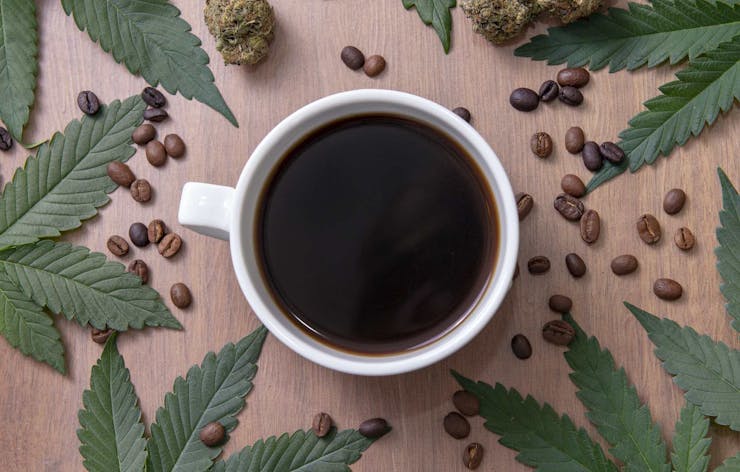There’s no denying that coffee and cannabis are both popular. What’s perhaps less clear is how coffee and cannabis consumption overlap, but with the rise of infused coffee products, it’s safe to say pairing coffee with cannabis is pretty common.
Personally, I’ve consumed coffee and cannabis almost daily for nearly a decade and they both enrich my life. Still, mixing them harmoniously has been a journey for me. Initially, I found the pairing unsettling: The taste of my pipe ruined the taste of my coffee, and I became unbearably jittery when I smoked weed with my morning java.
I thought mixing marijuana and coffee was the quickest way to ruin my morning until I tried vaping, at which point I had a completely different experience: an energized wake and bake with no nasty aftertaste or unpleasant side effects. When I quit inhalants and switched to tinctures and edibles only, I discovered that what works best for me is consuming cannabis immediately after finishing my coffee and a small breakfast or right after drinking my first two cups of coffee.
Clearly, I’ve got my cannabis and coffee routine down, but everyone’s body is different. Let’s take a look at how these two substances affect the body and hear from some experts on cannabis and health.
How coffee affects the endocannabinoid system
A 2018 study in the Journal of Internal Medicine looked at different metabolites—substances created when the body metabolizes food, drugs, and other substances—in the urine of coffee drinkers. Subjects abstained from coffee for one month, consumed four cups daily the next month, and then consumed eight cups daily for one month after that.
The study found that there was a reduction in metabolites of the endocannabinoid system (ECS) with increased coffee consumption, meaning the ECS began metabolizing less and less as study participants upped their coffee intake.
“We can infer from this finding that coffee, and I would speculate more specifically caffeine, can slow down the endocannabinoid system,” said Dr. Shawn Meirovici, ND, naturopathic doctor and cannabis specialist.
“Caffeine is a stimulator of nerve activity … and endocannabinoids are inhibitors of nerve activity. It would seem that coffee/caffeine may decrease this inhibitory activity and therefore may alter the calming [effect] of our endocannabinoid system, making it harder for the body to chill out,” said Dr. Meirovici.
In other words, according to Dr. Meirovici, the study results suggest that coffee or caffeine may actually prevent the ECS from metabolizing at the rate it normally would, making it harder for you to relax.
How coffee and cannabis interact in the body
There aren’t a ton of studies on how cannabis and coffee interact with each other in the human body, but a 2014 study on squirrel monkeys examines THC and MSX-3, a caffeine-like compound. When they consumed low doses of the caffeine compound, the monkeys wanted less THC; but when they consumed high doses of caffeine, they wanted more THC.
Shop highly rated dispensaries near you
Showing you dispensaries near“It is possible that low doses of caffeine may not affect the ECS all that much and therefore the monkeys were satisfied with their ‘high,’ but at high doses the monkeys may have slowed their endocannabinoid function, therefore requiring more cannabinoids to get a satisfactory ‘high,’” said Dr. Meirovici.
According to Dr. Meirovici, essentially, since the squirrel monkeys gave themselves larger doses of THC when they consumed larger doses of caffeine, the study results suggest that large doses of caffeine may negatively affect one’s high, leading to the need for more THC.
Regarding memory, a 2012 study on rats examined how a combination of caffeine and THC impaired working memory—aka short-term memory—more than THC on its own.
The rats were given various combinations of THC and caffeine and then subjected to memory tests to determine if they would respond to light patterns and delays, which were preceded by the release of food pellets. At the end of the study, the rats performed better memory-wise after consuming caffeine or THC than they did after consuming caffeine and THC together.
Ingesting vs. inhaling cannabis
When cannabis is inhaled, it enters the bloodstream rapidly via the lungs, whereas ingested cannabis is largely metabolized by the liver. “THC, aka Delta-9-THC, enters into the bloodstream and peaks after 10 to 15 minutes and is almost fully eliminated at 75 minutes. When we consume an edible, most of the THC is metabolized by the liver and is converted into a compound called 11-OH-THC, which is three to seven times more potent than Delta-9-THC,” said Dr. Meirovici.
He also points out that edibles take nearly six hours to peak in the bloodstream, therefore producing a much more drawn out and potentially more intense high.
Additionally, we know that caffeine is also metabolized by the liver. “It would seem like there is much more potential for interaction (desired and undesirable) if consuming coffee and any edible forms of cannabis,” said Dr. Meirovici.
Since both THC and caffeine are metabolized by the same liver enzyme, there is “more likely going to be a combined effect with these two compounds either amplifying or diminishing one another,” said Dr. Meirovici.
A note on consuming coffee and cannabis safely
There’s still much we don’t know about how cannabis and coffee affect the human body, and no two bodies are exactly the same. But if you’re healthy and you have a good relationship with caffeine and cannabis, there’s no reason you shouldn’t enjoy them together. Always remember to “start low and go slow.”
Dr. Meirovici advises caution for those living with impaired liver function, memory impairment or dementia, and anyone with a history of addiction, since these conditions could be exacerbated by coffee and cannabis.





